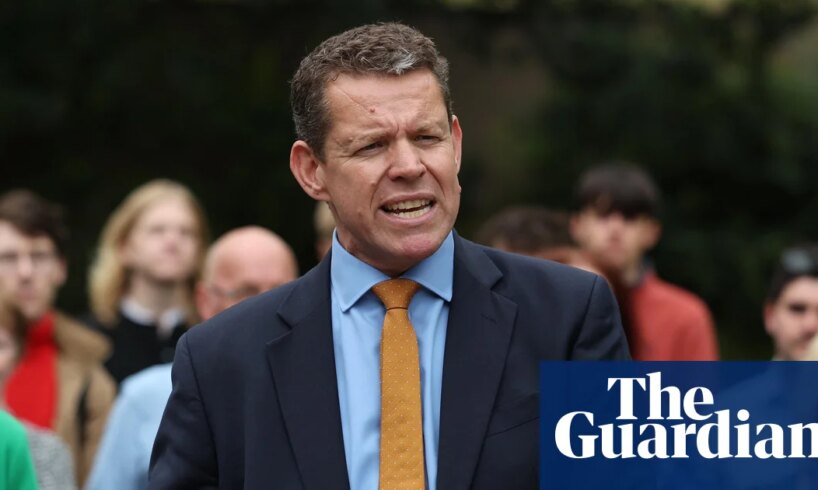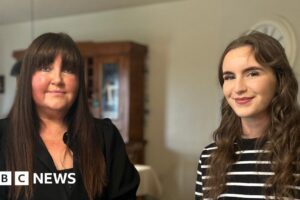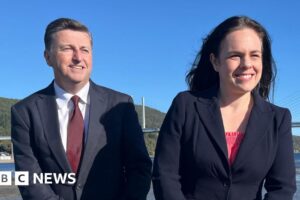
The leader of Plaid Cymru, Rhun ap Iorwerth, has said next year’s Welsh parliament elections will be a two-horse race between his party and Reform UK.
Ap Iorwerth said voters could choose to back Plaid’s vision of a progressive Wales or face the division that Reform thrives on.
Speaking on the eve of his party’s conference in Swansea, he said an advantage of a Plaid-led government was that it would not have to answer to bosses in London, as he argued both Reform and Labour had to.
He accepted Plaid was unlikely to win an outright majority at the Senedd elections but said it would look to work with other parties – though not Reform – in a mature way.
Speaking to the Guardian, he said: “The picture of Welsh politics is changing and Plaid Cymru is the voice of progressive Wales. We have consistent polling showing Plaid Cymru in the lead. Reform is also polling well and Labour is falling further behind. I think it’s becoming more and more clear it’s a two-horse race – Reform’s division versus Plaid’s vision.”
According to a YouGov poll, 30% of people would vote for Plaid at the Senedd elections, 29% for Reform and only 14% for Labour, which has governed in Wales for a century.
Nigel Farage (left) and Rhun ap Iorwerth take part in a BBC debate before the 2024 general election. Photograph: Jeff Overs/PA
Labour’s standing in Wales has dropped off a cliff since Vaughan Gething stepped down as first minister last year amid a donations scandal. His successor, Eluned Morgan, has tried but so far failed to draw a line between Welsh Labour and the UK party.
Ap Iorwerth said Reform’s rise in Wales was part of a “global phenomenon of the growth of the populist right”.
“We in Wales are not immune from that, but they need divided communities to thrive,” he said. “They need to pitch neighbour against neighbour, doubting authority to survive. Reform aren’t special. If it wasn’t Reform, it would be somebody else because that’s the direction of travel we have been going in in world politics.
“I think we are at a point in political history in Wales where change is possible. For the first time, people are starting to believe Labour hegemony can be brought to an end. They’ve run out of ideas, run out of steam. Many people within the Labour party themselves openly concede to me that they need time in opposition now.”
He also claimed Morgan’s instinct was not to make life too difficult for Keir Starmer. “I don’t have to try to measure my politics against how my words might cause offence to a party boss in London because I don’t have a boss in London,” he said. “My boss is the people of Wales.”
Ap Iorwerth criticised an attack by Morgan at the Labour party conference in which she accused Plaid and Reform of “divisive nationalism”, summing them up as“different poison, same bottle”.
Eluned Morgan gives her speech at Labour party conference in Liverpool. Photograph: Phil Noble/Reuters
“The language has disappointed many people, not least within the Labour movement,” he said. “Progressive people in politics need to absolutely have debates on policy and priorities, but the language used was unbecoming of her role as first minister.”
skip past newsletter promotion
Our morning email breaks down the key stories of the day, telling you what’s happening and why it matters
Privacy Notice: Newsletters may contain information about charities, online ads, and content funded by outside parties. If you do not have an account, we will create a guest account for you on theguardian.com to send you this newsletter. You can complete full registration at any time. For more information about how we use your data see our Privacy Policy. We use Google reCaptcha to protect our website and the Google Privacy Policy and Terms of Service apply.
after newsletter promotion
He said his party would work with others after next year’s elections. “It’s unlikely that there will be a party with a majority from May next year. We want to lead the Welsh government. If we don’t have a majority, we look then for ways of getting other parties to back our programme, and we do so in a mature way.”
He insisted next year’s election would not be a poll on independence, which is one of Plaid’s ultimate aims. But he said: “I have always believed that in order to fulfil our potential we need a significant redesign of the United Kingdom, whereby you have four independent nations working closely together.
“I want to lead that conversation and get people more confident and curious and ambitious about what we can achieve as a nation.”
Asked when he thought Wales might become independent, he said: “The honest answer is, when the people of Wales are ready for it. It’s about hopefully persuading my fellow countrymen to engage with what the possibilities are for our country. And they will know when the time is right.”
Among the fringe events at the Plaid conference is “culture as a catalyst”. Ap Iorwerth said: “I firmly believe that our culture, our Welsh language are something that we can, should and do celebrate as a nation and can be the building blocks of where we go next, building an international presence through art and music and sport.”
Twelve years ago, ap Iorwerth was a political journalist. Now he may be a first minister in waiting. “I made the call that having been an observer, I wanted to see if I could make a hands-on contribution. There’s an opportunity here to change direction as a nation.”





